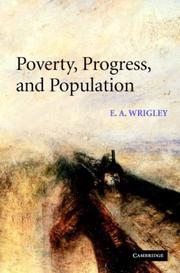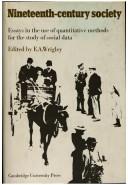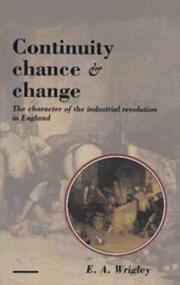| Listing 1 - 10 of 51 | << page >> |
Sort by
|
Multi
ISBN: 9780521766937 9780521131858 0521766931 0521131855 9780511779619 9780511918292 0511918291 0511779615 1282818600 9781282818606 9780511914522 0511914520 9780511916328 0511916329 0511851618 9780511851612 1107208998 9781107208995 9786612818608 6612818603 0511917317 9780511917318 0511912714 9780511912719 Year: 2010 Publisher: Cambridge Cambridge University Press
Abstract | Keywords | Export | Availability | Bookmark
 Loading...
Loading...Choose an application
- Reference Manager
- EndNote
- RefWorks (Direct export to RefWorks)
The industrial revolution transformed the productive power of societies. It did so by vastly increasing the individual productivity, thus delivering whole populations from poverty. In this new account by one of the world's acknowledged authorities the central issue is not simply how the revolution began but still more why it did not quickly end. The answer lay in the use of a new source of energy. Pre-industrial societies had access only to very limited energy supplies. As long as mechanical energy came principally from human or animal muscle and heat energy from wood, the maximum attainable level of productivity was bound to be low. Exploitation of a new source of energy in the form of coal provided an escape route from the constraints of an organic economy but also brought novel dangers. Since this happened first in England, its experience has a special fascination, though other countries rapidly followed suit.
History of the United Kingdom and Ireland --- anno 1800-1899 --- Révolution industrielle --- --Angleterre --- --Énergie --- --Histoire économique et sociale --- --Industrie --- --Power resources --- Coal trade --- Industrial revolution --- Charbon --- Ressources énergétiques --- History. --- Commerce --- History --- 620.9 <41> --- 338 <09> <41> --- Economics of energy in general--Verenigd Koninkrijk van Groot-Brittannië en Noord-Ierland --- Economische geschiedenis--Verenigd Koninkrijk van Groot-Brittannië en Noord-Ierland --- Power resources --- 338 <09> <41> Economische geschiedenis--Verenigd Koninkrijk van Groot-Brittannië en Noord-Ierland --- Energy --- Energy resources --- Power supply --- Natural resources --- Energy harvesting --- Energy industries --- Coal industry --- Fuel trade --- Énergie --- Histoire économique et sociale --- Industrie --- Power resources - Great Britain - History. --- Coal trade - Great Britain - History. --- Industrial revolution - Great Britain. --- Révolution industrielle - Grande-Bretagne --- Charbon - Commerce - Grande-Bretagne - History --- Ressources énergétiques - Grande-Bretagne - History --- Angleterre
Book
ISBN: 0631139915 Year: 1987 Publisher: New York
Abstract | Keywords | Export | Availability | Bookmark
 Loading...
Loading...Choose an application
- Reference Manager
- EndNote
- RefWorks (Direct export to RefWorks)
History of Europe --- anno 1500-1799 --- anno 1800-1899 --- Urban economics --- Cities and towns --- Fertility, Human --- Economie urbaine --- Villes --- Fecondite --- History --- Growth --- Histoire --- Croissance --- Europe --- Industries --- Industrie --- -Fertility, Human --- -Industries --- -711.4 --- Industrial production --- Industry --- Economics --- Human fertility --- Natality --- Demography --- Human reproduction --- Infertility --- Global cities --- Municipalities --- Towns --- Urban areas --- Urban systems --- Human settlements --- Sociology, Urban --- -History --- Gemeentelijke planologie. Stadsplanning. Stedenbouw --- Council of Europe countries --- Eastern Hemisphere --- Eurasia --- Population --- -History. --- 711.4 Gemeentelijke planologie. Stadsplanning. Stedenbouw --- 711.4 --- Growth&delete& --- History. --- Geschiedenis van Europa --- Démographie --- Fécondité humaine --- Grande-Bretagne --- Revolution industrielle --- Sociologie urbaine

ISBN: 0521822785 0521529743 0511165374 051116596X 0511312857 0511616368 1280437650 0511164017 0511164815 1107145988 9780511165962 9780511164019 9780511164811 9780521822787 9780521529747 9780511165375 9780511616365 9781280437656 9781107145986 9780511312854 9786610437658 6610437653 Year: 2004 Publisher: Cambridge Cambridge University Press
Abstract | Keywords | Export | Availability | Bookmark
 Loading...
Loading...Choose an application
- Reference Manager
- EndNote
- RefWorks (Direct export to RefWorks)
By the early nineteenth century England was very different economically from its continental neighbours. It was wealthier, growing more rapidly, more heavily urbanised, and far less dependent upon agriculture. A generation ago it was normal to attribute these differences to the 'industrial revolution' and to suppose that this was mainly the product of recent change, but no longer. Current estimates suggest only slow growth during the period from 1760-1840. This implies that the economy was much larger and more advanced by 1760 than had previously been supposed and suggests that growth in the preceding century or two must have been decisive in bringing about the 'divergence' of England. Sir E. A. Wrigley, the leading historian of industrial Britain, here examines the issues which arise in this connection from three viewpoints: economic growth; the transformation of the urban-rural balance; and demographic change in the seventeenth and eighteenth centuries.
History of the United Kingdom and Ireland --- anno 1600-1699 --- anno 1700-1799 --- anno 1800-1899 --- Cities and towns --- Industrial revolution --- Growth --- History --- England --- Economic conditions --- Population --- Arts and Humanities --- Economic conditions. --- History. --- Revolution, Industrial --- Economic history --- Social history --- Global cities --- Municipalities --- Towns --- Urban areas --- Urban systems --- Human settlements --- Sociology, Urban --- Growth&delete& --- Angleterre --- Anglii︠a︡ --- Inghilterra --- Engeland --- Inglaterra --- Anglija --- England and Wales

ISBN: 0521084121 0521073308 0511896115 Year: 1972 Publisher: Cambridge : Cambridge University Press,
Abstract | Keywords | Export | Availability | Bookmark
 Loading...
Loading...Choose an application
- Reference Manager
- EndNote
- RefWorks (Direct export to RefWorks)
The aim of this book is to demonstrate both the difficulties and the opportunities which the accumulation of statistical information in economically advanced countries offers for studying nineteenth-century society in depth. The chief emphasis is upon quantitative methods of analysis. The main focus of the attention is the census - what information was required on census night; how the information was collected; how accurately and completely population characteristics were recorded, the problems which arise in attempting to use either the published census volumes or the enumerators' books; and the techniques which have proved useful in analysis. Related topics covered include the study of family structure, the use of information about occupation, the measurement of migration, criminal statistics, educational provision and sampling in historical research.
Great Britain --- Grande-Bretagne --- Statistical services --- Services statistiques --- Arts and Humanities --- History --- Social history --- Statistical methods. --- Statistical services. --- Descriptive sociology --- Social conditions --- Sociology --- Grande-bretagne --- Histoire sociale moderne --- 19e siecle
Multi
ISBN: 9781316504284 9781107135710 131650428X 1107135710 9781316488256 1316540790 1316537781 131648825X Year: 2016 Publisher: Cambridge Cambridge University Press
Abstract | Keywords | Export | Availability | Bookmark
 Loading...
Loading...Choose an application
- Reference Manager
- EndNote
- RefWorks (Direct export to RefWorks)
Before the industrial revolution prolonged economic growth was unachievable. All economies were organic, dependent on plant photosynthesis to provide food, raw materials, and energy. This was true both of heat energy, derived from burning wood, and mechanical energy provided chiefly by human and animal muscle. The flow of energy from the sun captured by plant photosynthesis was the basis of all production and consumption. Britain began to escape the old restrictions by making increasing use of the vast stock of energy contained in coal measures, initially as a source of heat energy but eventually also of mechanical energy, thus making possible the industrial revolution. In this concise and accessible account of change between the reigns of Elizabeth I and Victoria, Wrigley describes how during this period Britain moved from the economic periphery of Europe to becoming briefly the world's leading economy, forging a path rapidly emulated by its competitors.
Energy development --- Industrial revolution --- Economic history. --- Energy development. --- Industrial revolution. --- Rural conditions. --- Industriella revolutionen. --- Industrialisering --- Historia. --- Bevölkerungswachstum. --- Energieerzeugung. --- Wirtschaftsentwicklung. --- Wirtschaftswachstum. --- historia. --- 1500-1800. --- 1800-talet. --- England --- Storbritannien. --- England. --- Economic conditions. --- History of the United Kingdom and Ireland --- anno 1700-1799 --- anno 1800-1899 --- Energy resources development --- Energy source development --- Power resources development --- Power resources

ISBN: 0521356482 0521396573 1139168045 9780521396578 9780521356480 9781139168045 Year: 1988 Publisher: Cambridge : Cambridge University Press,
Abstract | Keywords | Export | Availability | Bookmark
 Loading...
Loading...Choose an application
- Reference Manager
- EndNote
- RefWorks (Direct export to RefWorks)
The Industrial Revolution brought into being a distinct world, a world of greater affluence, longevity and mobility, an urban rather than a rural world. But the great surge of economic growth was balanced against severe constraints on the opportunities for expansion, revealing an intriguing paradox. This book, published to considerable critical acclaim, explores the paradox and attempts to provide a distinct model' of the changes that comprised the industrial revolution.
Industrial revolution --- History of the United Kingdom and Ireland --- anno 1700-1799 --- anno 1800-1899 --- Industries --- History --- England --- Economic conditions --- Social conditions --- Grande-Bretagne --- Arts and Humanities --- Industries - England - History - 19th century --- England - Economic conditions - 19th century --- England - Social conditions - 19th century --- Revolution, Industrial --- Economic history --- Social history --- Revolution industrielle
Book
Year: 1973 Publisher: London Edward Arnold
Abstract | Keywords | Export | Availability | Bookmark
 Loading...
Loading...Choose an application
- Reference Manager
- EndNote
- RefWorks (Direct export to RefWorks)
Book
Year: 1969 Publisher: London Weidenfeld and Nicolson
Abstract | Keywords | Export | Availability | Bookmark
 Loading...
Loading...Choose an application
- Reference Manager
- EndNote
- RefWorks (Direct export to RefWorks)
Book
Year: 1973 Publisher: London Weidenfeld and Nicolson
Abstract | Keywords | Export | Availability | Bookmark
 Loading...
Loading...Choose an application
- Reference Manager
- EndNote
- RefWorks (Direct export to RefWorks)
Book
Year: 1969 Publisher: Amsterdam Meulenhoff
Abstract | Keywords | Export | Availability | Bookmark
 Loading...
Loading...Choose an application
- Reference Manager
- EndNote
- RefWorks (Direct export to RefWorks)
| Listing 1 - 10 of 51 | << page >> |
Sort by
|

 Search
Search Feedback
Feedback About UniCat
About UniCat  Help
Help News
News